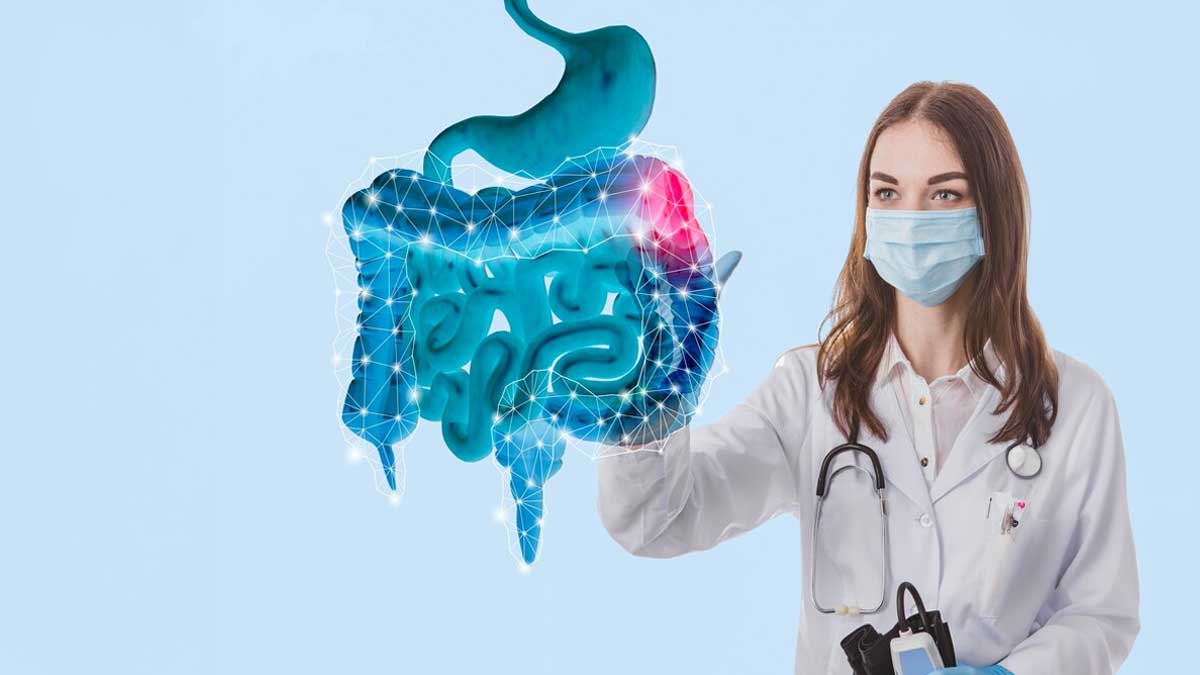
Gastrointestinal cancer (GI) develops when some cells in the gastrointestinal system grow uncontrollably and abnormally. This type of cancer may not be as widely discussed, they constitute a substantial health concern for women. It is important to understand the risk factors, symptoms, and adopting preventive measures, such as a healthy lifestyle and routine screenings, can empower women to take charge of their digestive health and overall well-being.
Table of Content:-
In an interaction with Only My Health, Dr Prabhu Nesargikar, Senior Consultant, GI Robotic Surgeon, HCG Cancer Centre Hospital, KR Road, Bengaluru explains all about gastrointestinal cancer in women.
Types of GI cancers affecting women
According to Dr Nesargirkar, the following are the types of gastrointestinal cancer in women.
Esophageal cancer
This affects the tube connecting the throat to the stomach. Symptoms can include difficulty swallowing, dysphagia ( food sticking in the gullet), heartburn, and vomiting blood.
Also read: Sign Of Pancreatic Cancer That Can Show Up On The Face
Stomach cancer
This affects the stomach lining and can cause abdominal pain, reflux symptoms, bloating, loss of appetite, weight loss and blood loss resulting in anaemia

Colorectal cancer
This affects the colon and rectum and can cause changes in bowel habits ( sudden constipation or diarrhoea), blood in the stool, bloatedness and weight loss.
Pancreatic cancer
This affects the pancreas and can cause abdominal pain, jaundice, and weight loss. This affects the pancreas and can cause abdominal pain, jaundice, and weight loss. According to 2017-2019 estimates, around 1.7 percent of men and women will be diagnosed with pancreatic cancer at some point in their lives.
Liver cancer
This affects the liver and can cause abdominal pain, jaundice, fatigue, and weight loss.

Gastrointestinal (GI) cancer primarily affects older adults, with the risk significantly rising after the age of 50, however, we are now seeing an increasing trend in younger generations. Many of the symptoms of GI cancer are usually ignored, but if not going away, better to seek advice from doctors early.
Also read: Gynaecological Cancer: Common Warning Signs On Should Know
What Are the Major risk factors
Several factors can increase a woman's risk of developing GI cancers, including:
- Age: The risk generally increases with age, especially after 50.
- Family history: Having a close ( first line blood) relative with GI cancer increases your risk, especially colorectal cancer
- Lifestyle: Smoking, excessive alcohol consumption, tobacco chewing, and a diet high in processed meats and low in fruits and vegetables can contribute to the risk.
- Obesity: Overweight and decreased physical activity increases the risk of GI cancer
- Underlying medical conditions: Certain conditions like chronic inflammation ( ulcerative colitis) gastric ulcers can lead to GI cancers
Early detection and prevention
Early detection of GI cancers is important for successful treatment. Regular screenings are essential for women at average risk, especially those with a family history or other risk factors. Early detection through screenings like colonoscopies, endoscopies, and blood tests can significantly improve the chances of survival and persisting symptoms should not be ignored.
- While some factors remain beyond our control, certain lifestyle modifications can help reduce the risk of GI cancers:
- Maintain a healthy weight
- Aim for a balanced diet rich in fruits, vegetables, and whole grains. Limit red meat, processed foods, and sugary drinks.
- Exercise regularly
- Aim for at least 30 minutes of moderate-intensity exercise most days of the week.
- Avoid smoking and excessive alcohol consumption
- These habits significantly increase the risk of various GI cancers.
- Get regular screenings
Talk to your doctor about the appropriate screening schedule based on your age and risk factors. By understanding the risk factors, symptoms, and early detection methods, women can take control of their health and make informed decisions. Open communication is crucial for timely diagnosis and effective treatment. Remember, early detection and awareness are key to fighting GI cancers and winning over them.
Also watch this video
How we keep this article up to date:
We work with experts and keep a close eye on the latest in health and wellness. Whenever there is a new research or helpful information, we update our articles with accurate and useful advice.
Current Version